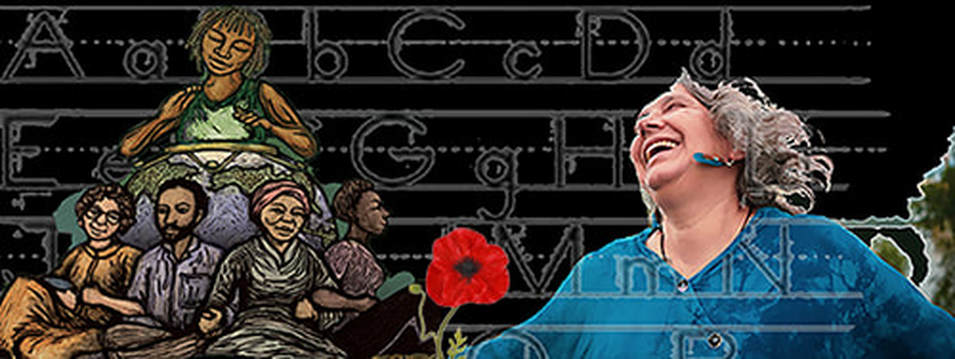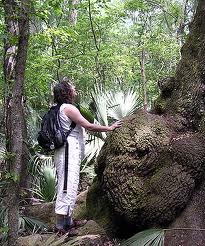|
On the north side of the mountains, the overgrown side,where the trees have not been cut in at least 90 years, there are seven springs. One of them at least flows into the tiny Río Sapo and makes its way to the Caribbean sea. That northern slope, un-terraced, wild, always captured my imagination as a child. Living as we did on the very crest of the Cordillera Central, we could look down to the coast on three sides. Away to the north are the limestone karst hills near Arecibo, tiny carved and cave riddled hills resembling Chinese landscape paintings. When the rains came from that side, we could see its path as it struck the silver-lined leaves of yagrumo trees, flipping them so the undersides showed white, a wave of water walking across the far slope and the valley until the first drops began to strike the tin roof with a noise like hail. That uncultivated valley was full of lizard cuckoos, whose cries, like hoarse laughter, also seemed to come just before the rain. Rain ruled our lives in so many ways, the presence of water and its absence. As humidity rises in the mountains, insects come out into the air and swallows and other birds begin swooping and diving to eat the, The little coquís in the underbrush sing more loudly, and the air itself seems to wake up and shout. I speak in past tense, about the years of my childhood in this place, but I am sitting here now, at Km 18.8 on Rt 120, 23 minutes downhill from our farm, which I visited yesterday, stepping only a few feet into the dense thickets of tall grass, guayaba, fragrant weeds whose names I never knew. The foliage is too thick to take on without boots and a machete. But I stood for a while at the edge of the road, where our neighbor Elio has cleared a patch to build his house, and looked at the wall of green that marks our property line. Chilo across the way always asks if we’re sure we don’t want to sell, how it would look better cleaned up, planted. He doesn’t see the beauty or necessity of that forested mountaintop. I try to tell people that it’s a rain farm, a watershed for the whole area, a place where the cool air among the trees makes the clouds condense into drops, but that’s just a way of naming something they might recognize as useful. Elio and his father Luis, who is 97, have that other feel for the land, the love of the “monte,” that green smell that is the breath of many plants together. Poverty blunts ecological sensibility. A few years ago I met my childhood friend Tita in Brooklyn, where she has lived for decades. “We didn’t know what we had,” she said. But I did. I was an insider and an outsider, both. My Ukrainian Jewish ecologist father, my Harlem born Puerto Rican artist and amateur naturalist mother, cultivated our kinship with this land. We stalked birds and lizards, studied ants, gathered seeds and ferns and snail shells, used my father’s microscope to probe more deeply into the nature of things, watched for the tiny toadies, green balls of fluff with red throats, croaking on the señorita branches, guaraguao circling overhead causing the small birds to freeze in place, ruby throated hummingbirds and the tiny burrowing owls called múcaros. We knew the trees by their nature if not their names. By their smells. My father told us about the transplants, the African Tulip Tree, tulipán, the Venezuelan guamá, brought here long ago, when the slopes were cleared for coffee and planted with shade. And we knew the shaggy, thin haired Australian pine, the yagrumo, the brucal with its tubular red flowers that the children made into whistles. My best friend Tata, Luis’ daughter, shares the sensibilities of her father and brother, and speaks of the forests as the lungs of the world. When we were in seventh grade, at a school halfway to the coast, we would miss the bus sometimes, and walk downhill for four hours, picking guanábana and guayaba, corazón and pomarosa, drinking from springs and breathing the green air. But many of the people of the barrio took the natural world for granted, chopped and hacked at it for their own purposes, and tossed trash into the underbrush. One time when I came back to visit I found a huge pile of soiled disposable diapers that the neighbors had crossed the road to dump on our land. For them the monte was maleza, just weeds, just wasted space. People look at our farm and say, “se está perdiendo,” it’s being lost—lost to the marketplace, lost to the few extra truckload of coffee or bananas or oranges it could be contributing to the warehouses in the towns. The name of our barrio, the Maricao half, not the Yauco half, is Indiera, place of the indigenous people, who withdrew into these heights to escape the ceaseless domination of the Spanish, who wanted slaves, not teachers. For the Taino, trees were like chieftains. When a great tree was cut to make a canoa, it was given a name and honored before it was felled. Since my last visit, another neighbor cut down a mature mango tree, bulldozed an incursion into our farm and laid asphalt for parking. It’s not the only incursion. Men have climbed up into the heights who carry guns and sell cocaine. Just last week, a man was murdered a short way from our land, shot eleven times and left dead on the ground. This kind of crime is new here, and people are in shock. The crimes we know are petty thefts and vandalism, the hidden crimes of domestic violence and sexual exploitation, and the great grinding crimes of class. This morning I dreamt that my Taino ancestors were speaking to me, telling me, in the voices of owls, that the springs, the trees, the awareness held in that small mountaintop forest, were reservoirs of soul, that the bond to the land is essential, that without it, the people become more and more like the invaders, that I must protect the bosque, drink from its springs each day, no matter where I am, cultivate the bond in me and in others. It was the barred owls, not the múcaros, still calling all around me as I woke in the predawn. The same owls or their close relations, make the same call in the woods of Vermont. And now the sky uphill from me is growing dark grey, the clouds descending onto the mountaintops. A large brown lizard slithers through the vegetation at the edge of this patio, licking ants from dry leaves. The air is electric, motionless and awake, expecting rain. Tomorrow I must leave my mountains, make my way to the city, and then fly to Boston, where it’s twelve degrees and uniformly grey and icy. But I have been given my task. To drink from the seven springs of my mountain and let the clear water flow out again through my pen, to give my mountain a human voice, to let the forest, and all this precious wounded island speak through me. believe the dream. I believe that when we lose our kinship with the land we lose our souls. I believe that kinship is wrested from us, in violence, by the invaders, the dominators, by poverty and hunger and war, by foreign corporations making it impossible to live from the land so that we sell it to them. There is no sovereign forest without people who have enough sovereignty to protect it. We must love it enough to root in it, draw from its strength, know that it’s worth fighting for. Sovereignty, freedom from rule, isn’t won just by loving and respecting the land, but perhaps it begins there. Once I am back in Boston, with the internet speed of the metropolis, I'll upload photos.
0 Comments
Your comment will be posted after it is approved.
Leave a Reply. |
About Aurora
Aurora Levins Morales is a disabled and chronically ill, community supported writer, historian, artist and activist. It takes a village to keep her blogs coming. To become part of the village it takes, donate here. Never miss a post!
Click below to add this blog to your favorite RSS reader: Archives
September 2017
Categories
All
|


 RSS Feed
RSS Feed
